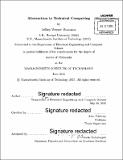| dc.contributor.advisor | Alan Edelman. | en_US |
| dc.contributor.author | Bezanson, Jeffrey Werner | en_US |
| dc.contributor.other | Massachusetts Institute of Technology. Department of Electrical Engineering and Computer Science. | en_US |
| dc.date.accessioned | 2015-11-09T19:50:22Z | |
| dc.date.available | 2015-11-09T19:50:22Z | |
| dc.date.copyright | 2015 | en_US |
| dc.date.issued | 2015 | en_US |
| dc.identifier.uri | http://hdl.handle.net/1721.1/99811 | |
| dc.description | Thesis: Ph. D., Massachusetts Institute of Technology, Department of Electrical Engineering and Computer Science, 2015. | en_US |
| dc.description | Cataloged from PDF version of thesis. | en_US |
| dc.description | Includes bibliographical references (pages 133-143). | en_US |
| dc.description.abstract | Array-based programming environments are popular for scientific and technical computing. These systems consist of built-in function libraries paired with high-level languages for interaction. Although the libraries perform well, it is widely believed that scripting in these languages is necessarily slow, and that only heroic feats of engineering can at best partially ameliorate this problem. This thesis argues that what is really needed is a more coherent structure for this functionality. To find one, we must ask what technical computing is really about. This thesis suggests that this kind of programming is characterized by an emphasis on operator complexity and code specialization, and that a language can be designed to better fit these requirements. The key idea is to integrate code selection with code specialization, using generic functions and data-flow type inference. Systems like these can suffer from inefficient compilation, or from uncertainty about what to specialize on. We show that sufficiently powerful type-based dispatch addresses these problems. The resulting language, Julia, achieves a Quine-style "explication by elimination" of many of the productive features technical computing users expect. | en_US |
| dc.description.statementofresponsibility | by Jeffrey Werner Bezanson. | en_US |
| dc.format.extent | 143 pages | en_US |
| dc.language.iso | eng | en_US |
| dc.publisher | Massachusetts Institute of Technology | en_US |
| dc.rights | M.I.T. theses are protected by copyright. They may be viewed from this source for any purpose, but reproduction or distribution in any format is prohibited without written permission. See provided URL for inquiries about permission. | en_US |
| dc.rights.uri | http://dspace.mit.edu/handle/1721.1/7582 | en_US |
| dc.subject | Electrical Engineering and Computer Science. | en_US |
| dc.title | Abstraction in technical computing | en_US |
| dc.type | Thesis | en_US |
| dc.description.degree | Ph. D. | en_US |
| dc.contributor.department | Massachusetts Institute of Technology. Department of Electrical Engineering and Computer Science | |
| dc.identifier.oclc | 927297147 | en_US |
